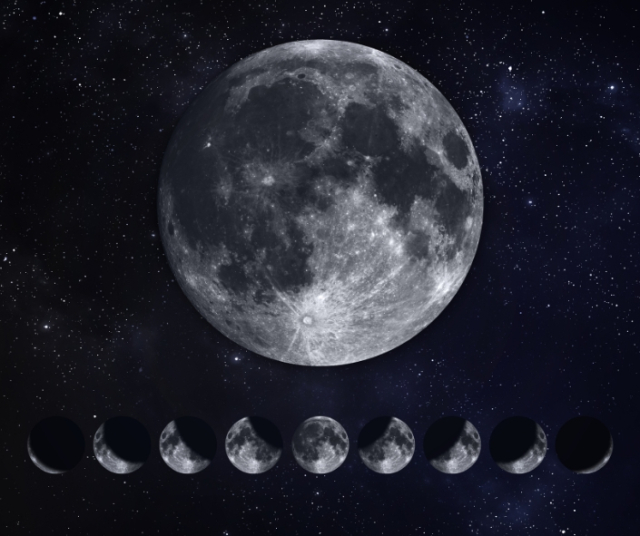In the vast and enigmatic world of astronomy, the Moon plays a crucial role. Its monthly cycle has fascinated humanity since time immemorial.
Moon phases
New Moon (April 1)
We open the month with the New Moon, a fascinating phenomenon in which the Moon is directly between the Earth and the Sun, resulting in the inability to see it from Earth. We will explore the cultural importance of this event and its influence on various practices and rituals.
Crescent Quarter (April 9)
Nine days later, we find ourselves in the First Quarter phase. We will detail how to identify this phase and how it affects tides and nighttime lighting.
Full Moon (April 16)
The Full Moon will light up our skies on April 16. We will investigate the different cultural names for the April full moons and explore the beliefs and myths associated with this celestial event.
Last Quarter (April 23)
We close the month with the Last Quarter, where the Moon begins to decrease its illumination. We will analyze how this phase marks the end of a lunar cycle and how it has influenced ancient and modern traditions.
Astronomical Events
Penumbral Lunar Eclipse (April 8)
A notable event in April will be the penumbral lunar eclipse on April 8. We will explain what a penumbral eclipse is, how it occurs and where it will be visible.
Meteor Shower (April 22)
In the second half of the month, astronomy enthusiasts will be able to enjoy a meteor shower. We will offer tips on how to get the best experience observing this celestial spectacle.
Influence on Agriculture and Everyday Life
Lunar Calendar and Agriculture
We will explore how the lunar calendar has historically been used in agriculture, from planting to harvest. We will investigate whether these centuries-old practices have any scientific basis.
Myths and Cultural Traditions
We will investigate the various mythologies and cultural traditions related to the Moon in different parts of the world. From celebrations to superstitions, we'll explore how the Moon has left its mark on human history.
Tips for Observing the Moon
Observing the Moon is a fascinating experience that connects us with the vast cosmos. Whether you're a seasoned astronomical enthusiast or a beginner just starting to explore the night sky, here you'll find valuable tips to get the most out of lunar observing in April 2024.
1. Basic Equipment:
To observe the Moon, you don't need a fancy telescope, although it is useful. Even a pair of binoculars can reveal surprising details on the lunar surface. If you have access to a telescope, use it! Be sure to adjust the appropriate settings for each moon phase and consider using a moon filter to reduce glare.
2. Know the Phases:
Before going out to observe the Moon, familiarize yourself with the lunar phases of the month. Each phase offers a unique view and changes the appearance of the lunar landscape. Use astronomical apps or lunar calendars to know what to expect and plan your observations accordingly.
3. Best Time to Observe:
While the Moon is visible throughout the night, certain times offer clearer and more detailed views. During the First Quarter and Last Quarter phases, shadows on the lunar surface highlight features such as craters and mountains. Observing near moonrise or moonset can provide sharper images due to the thinner atmosphere on the horizon.
4. Dark Places without Light Pollution:
To appreciate the Moon in all its splendor, look for dark places away from the light pollution of cities. Natural parks, viewpoints and rural areas are ideal. The lack of artificial lights will allow your eyes to adapt better to the darkness and appreciate more details.
5. Record your Observations:
Keeping an astronomical journal can be a rewarding experience. Note the lunar phases you observe, the features that catch your eye, and any notable changes in the Moon's appearance. This will not only help you track your progress, but will also allow you to appreciate the constant transformation of Earth's natural satellite.
6. Take Advantage of Additional Astronomical Events:
In April 2024, take advantage of additional astronomical events such as the penumbral lunar eclipse and meteor shower. Combine lunar viewing with these events for a complete celestial experience.
7. Share the Experience:
Moon watching is even more special when shared with others. Host observing nights with friends, family, or local astronomy groups. Sharing telescopes and experiences can make lunar observing even more enriching.
8. Applications and Online Resources:
Take advantage of technology to improve your observations. Apps like SkyView or Stellarium can help you identify lunar features and other celestial bodies. Specialized websites offer detailed maps of the Moon that will guide you through its surface.
In this journey through the April 2024 lunar calendar, we have discovered the fascinating interaction between the Earth, the Moon and the Sun.
